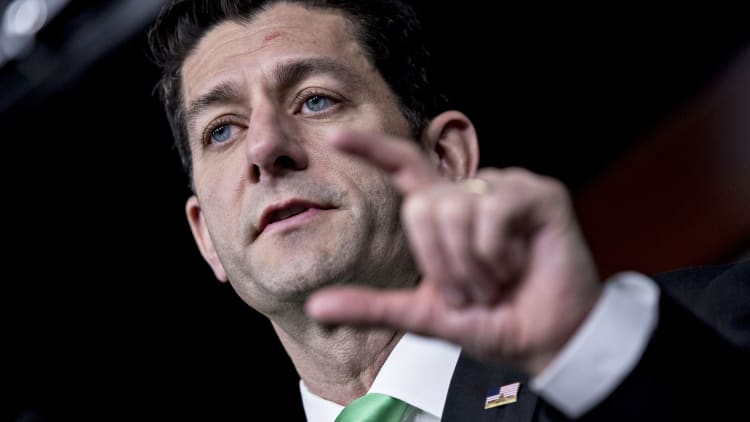
President Donald Trump reportedly warned Republican congressmen on Tuesday morning that many of them could lose their seats next year if they vote Thursday against the leading bill to repeal and replace key parts the Affordable Care Act.
Trump's stern message came during an unusual personal visit to Capitol Hill to spur wavering members of the GOP caucus to get behind the bill, known as the American Health Care Act.
On his way into that meeting, Trump said, "I think so," when a reporter asked if the bill has enough support among Republicans to be passed Thursday in a planned vote by the full House of Representatives.
Trump then continued walking to a meeting with the GOP caucus, which lasted about a half hour.
The president's visit came less than 12 hours after Republican leaders in the House unveiled changes to the bill that were designed to convince wavering caucus members to vote for the legislation.
That bill has drawn heavy criticism from conservative members of the GOP caucus for not doing enough to repeal Obamacare, while moderate members have worried about sharp decreases in the number of Americans with health coverage if the bill becomes law.
Republican leaders and the White House have aggressively lobbied to swing GOP members to support the bill, warning that the legislation may be the best chance ever to undo parts of Obamacare. The leadership can only afford to lose 21 Republican votes in the House to avoid defeat of the bill.
Despite the lobbying, Rep. Mark Meadows, the North Carolina Republican who heads the conservative House Freedom Caucus, on Monday night said, "Currently there are not enough votes to pass the legislation."
The changes announced Monday include speeding up repeal of Obamacare taxes by one year, to 2017. That would mean that, among other things, the Affordable Care Act mandate requiring most Americans to have health coverage of some sort or pay a fine would not be in force for this year, if the bill becomes law.
The revised bill also would further change the funding method to states from the federal government for Medicaid, as well allow states to set work requirements for that health coverage program for the poor.
Republican leaders also proposed letting the Senate add to the amount of tax credits people aged 50 to 64 would receive to help buy individual health insurance plans. The previous version of the bill would have led to many people in that age range paying sharply higher premiums.
The newly revised bill has not been "scored" by the Congressional Budget Office, the nonpartisan entity that provides cost and coverage estimates to Congress.
The CBO last week said that the original version of the bill would lead to 14 million more people being uninsured next year than would be the case if Obamacare remained in full effect. A total of 24 million more people would be uninsured by 2026 under that scenario, the office said.
The CBO also projected that federal spending would be reduced by a total of $337 billion by 2026 as a result of the reduction in the amount of federal aid given to people to help buy insurance under the GOP plan.


